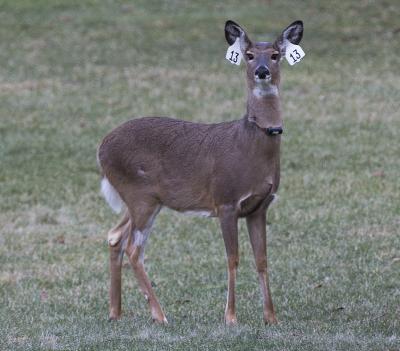Allege East Hampton Village Deer Sterilization Was Illegal

A complaint alleging that those engaged by East Hampton Village to sterilize deer were not licensed to practice veterinary medicine in New York State has been referred to the state attorney general’s office, it was learned this week.
Dell Cullum, a wildlife removal specialist and nature photographer who brought the complaint to the Office of Professional Discipline of the state Education Department, has received a letter dated Nov. 30 from a supervisor in that office saying “the investigation of your allegations is complete” and has been forwarded to the Criminal Prosecutions Bureau of the attorney general’s office. “The assigned prosecutor will contact you as necessary and you will be informed of the outcome of the case.”
The program, now in its second year, is intended to reduce the deer population through a five-year effort. Village officials and the president of White Buffalo, the nonprofit firm hired to conduct the sterilizations, insist that it complies with state regulations. The firm, which is based in Connecticut, had reported that it sterilized 114 deer last winter. It returned to the village in the fall to resume the program for a short time.
In his complaint, made in July, Mr. Cullum, an outspoken opponent of the program, described unpleasant deaths months after ovariectomies were performed on some of the does in a village-owned shed that he and others say was unsanitary.
Only persons holding state licenses can practice veterinary medicine in the state, and sterilization falls within the scope of veterinary medicine, according to Jeanne Beattie of the Education Department. There are two possible exemptions for out-of-state licensed veterinarians, however, one of which, said Anthony DeNicola, White Buffalo’s president, means its practices comply with the law.
According to the law, a veterinarian licensed in another state “who is meeting a veterinarian licensed in this state for purposes of consultation” may practice here, provided such practice is limited to consultation and “training and sharing of expertise.”
“Trying to work with experts in the field who have large-animal expertise to refine this method under field circumstances — that’s the whole premise behind this. That’s why we’re doing research,” Dr. DeNicola said yesterday. Sterilization of white-tail deer, he said, he said, is rare. “We’re the first to try to scale this, to bring the best minds on how to do this safely and effectively.”
Mr. DeNicola acknowledged having received an inquiry from the Office of Professional Discipline, but said those who have performed the sterilizations did so under the supervision of a state-licensed veterinarian, Dr. Steven Timm, who is based in Wisconsin.
“We’re not trying to do things illegally,” Dr. DeNicola said. “We’re following very rigid protocols. We have people that come in that are licensed, and folks coming in to get trained so folks in the future can be involved in these programs.” On two occasions, he said, state officials observed White Buffalo’s work in East Hampton. He also disagreed with Mr. Cullum’s and other opponents’ characterization of the shed in which the surgeries were performed, calling it clean and safe.
The village paid White Buffalo $140,000 for last winter’s effort and appropriated $50,000 in its 2015-16 budget for its continuation. Becky Molinaro, the village administrator, said yesterday that “it is our understanding that, per conversations that White Buffalo staff has had” with state officials, “that White Buffalo has been in compliance at all times.”
Mr. Cullum remains skeptical. “I would hope that if they suspect or have found criminal activity,” he said, referring to the Office of Professional Discipline, “they’re going to want to get on this immediately. I’m anxious to see how it trickles down. So many people aided and abetted, and even more stood by and watched it happen. That’s kind of sad, and kind of bad.”
